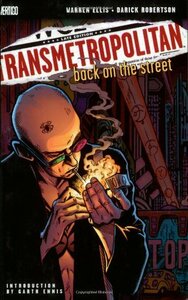You need to sign in or sign up before continuing.
Take a photo of a barcode or cover
if Hunter s Thompson lived in a consumerist, insane dystopian future. graphic, gross, and good
fast-paced
I liked this volume, but I can’t give it above a three because this is a political comic, from the 90s. some aspects will understandably feel dated.
Others will call it corny, but the live report of the “riot” having the power to pull back the cops was very moving to me. Journalism used to mean something, you know? It still does sometimes, but nowhere near that level of ‘truth prevailing.’ Sucks, man.
Others will call it corny, but the live report of the “riot” having the power to pull back the cops was very moving to me. Journalism used to mean something, you know? It still does sometimes, but nowhere near that level of ‘truth prevailing.’ Sucks, man.
funny
fast-paced
Plot or Character Driven:
Character
Strong character development:
No
Loveable characters:
Yes
Diverse cast of characters:
Yes
Flaws of characters a main focus:
Yes
seemed to be a bit of a mess. didn't really get it. maybe I'm just 15 year too late.
A fairly weak story, I came away from Transmetropolitan more interested in the wish-fulfillment presented in the character Spider Jerusalem. Jerusalem is an insufferable, tattooed, chain-smoking, nihilist, arrogant, slobbish asshole who is still somehow the hero of this book only because of the corruption around him. I've been seeing this same iconoclastic, self-righteous, anarchist type character a lot lately, mainly in comics and dystopian fiction, and at first I wondered why, before realizing it speaks to a lot of the readers who consume this type of literature.
Being unbeholden to any religious, political, or economic dogma sets Jerusalem apart from just about everyone else in the story. Everyone else is part of the corrupt corporatist system or a sheeple following some absurd belief system in order to escape the pressure of the city their living in. Having not drunk the cool-aid and having kept his integrity intact has somehow given Jerusalem the excuse to be an asshole to just about everyone in the story. He blows up buildings and offices on a whim, shirks responsibilities from his boss, insults his friends, and punches people before talking things out half a dozen times.
Again, I wondered why this type of character is present in Transmetropolitan (and similar stories lately), when a more moral, likeable character would've probably made the story better, before realizing that there's wish-fulfillment in being the asshole who blows things up and punches first, and asks questions second. Everyone has fantasized about being able to punch or bazooka whatever we want, and obviously there's a freedom in not caring about the consequences of our actions. Transmetropolitan paints Spider's assholery as somehow okay because he's not one of the sheeple, and I'm guessing a lot of readers have identified with that. It's certainly an attitude I've seen more and more on social media.
Now, you might call Transmetropolitan somewhat satirical in the way it portrays Spider and the things he rails against in the story, and I might agree, but the story also takes a moral stance on the conflicts within it. The way they're presented, with the kind of "let's burn and punch whatever we want because the system is corrupt anyway," while I can empathize with the sentiment, I found to be lazy and immature.
Being unbeholden to any religious, political, or economic dogma sets Jerusalem apart from just about everyone else in the story. Everyone else is part of the corrupt corporatist system or a sheeple following some absurd belief system in order to escape the pressure of the city their living in. Having not drunk the cool-aid and having kept his integrity intact has somehow given Jerusalem the excuse to be an asshole to just about everyone in the story. He blows up buildings and offices on a whim, shirks responsibilities from his boss, insults his friends, and punches people before talking things out half a dozen times.
Again, I wondered why this type of character is present in Transmetropolitan (and similar stories lately), when a more moral, likeable character would've probably made the story better, before realizing that there's wish-fulfillment in being the asshole who blows things up and punches first, and asks questions second. Everyone has fantasized about being able to punch or bazooka whatever we want, and obviously there's a freedom in not caring about the consequences of our actions. Transmetropolitan paints Spider's assholery as somehow okay because he's not one of the sheeple, and I'm guessing a lot of readers have identified with that. It's certainly an attitude I've seen more and more on social media.
Now, you might call Transmetropolitan somewhat satirical in the way it portrays Spider and the things he rails against in the story, and I might agree, but the story also takes a moral stance on the conflicts within it. The way they're presented, with the kind of "let's burn and punch whatever we want because the system is corrupt anyway," while I can empathize with the sentiment, I found to be lazy and immature.
Though I enjoyed this, it is NOT for everyone. Warren uses Spider as a political mouthpiece unapologetically. In volume one chapters include: Spider yells at cops, Spider yells at president, Spider yells at TV, Spider yells at religion.
I was sitting on this comic book volume for awhile because the art cover didn't quite appeal to me. It looked disgusting and nasty and vulgar, yet somehow Warren Ellis's Transmetropolitan remain a curiosity in my mind despite the many attempts for me in checking out at the library and returning it unread and doing it over and over until I finally got myself to read it today.
The artwork still doesn't appeal to me. Like I said, the vulgarness leaves a bad taste in my mouth, but it grew on me because the whole tone of this first volume is vulgar, intentionally so. It adds to the atmosphere on what is supposed to be a gritty, non-sugary world where everything is disgusting. At the center of this world is an eccentric erratic journalist by the name of Spider Jerusalem, who has to leave his mountain top shelter and go back into the city after he runs out of money and has to go back to his profession in order to fulfill his publishing contract to release two books.
Spider is one of those characters who has unlikeable qualities. He's rude, he curses, he's inconsiderate, yet I was drawn to him because he doesn't pretend to be anything else. That makes him a raw character who isn't afraid to say things people won't like to hear. That gives him a sense of credibility as a journalist, even if his critics might disagree. In a wild world that he has to return to, his ability to meet that world head on requires that bluntness.
It's a comic that's certainly relatable even today, in a world where journalistic integrity is questioned and the media landscape is much more fractured and chaotic, with the truth harder and harder to obtain. It's crazy for me to say this, but I kinda think we need the kind of journalism Spider offers, one that confronts the issues.
I'm not totally into this comic, but it has made an impression on me. I can sense that Ellis really does something here that is raw, and that's what's important.
The artwork still doesn't appeal to me. Like I said, the vulgarness leaves a bad taste in my mouth, but it grew on me because the whole tone of this first volume is vulgar, intentionally so. It adds to the atmosphere on what is supposed to be a gritty, non-sugary world where everything is disgusting. At the center of this world is an eccentric erratic journalist by the name of Spider Jerusalem, who has to leave his mountain top shelter and go back into the city after he runs out of money and has to go back to his profession in order to fulfill his publishing contract to release two books.
Spider is one of those characters who has unlikeable qualities. He's rude, he curses, he's inconsiderate, yet I was drawn to him because he doesn't pretend to be anything else. That makes him a raw character who isn't afraid to say things people won't like to hear. That gives him a sense of credibility as a journalist, even if his critics might disagree. In a wild world that he has to return to, his ability to meet that world head on requires that bluntness.
It's a comic that's certainly relatable even today, in a world where journalistic integrity is questioned and the media landscape is much more fractured and chaotic, with the truth harder and harder to obtain. It's crazy for me to say this, but I kinda think we need the kind of journalism Spider offers, one that confronts the issues.
I'm not totally into this comic, but it has made an impression on me. I can sense that Ellis really does something here that is raw, and that's what's important.
I like this comic. It is 'edgy'. I like it because it rails against the world it sees as the problem, while simultaneously inventing all sorts of new problems for the world. Like it says, what matters is not how much of the stuff that goes on there is shit, what matters is that the city is alive.
I couldn't help thinking of the movie 'Talk Radio' when I read this, it being one of my favorite movies, and the shared idea of the journalist who is wanting to be the furious messenger who is really, inside, the calm(?-nascent?) center of the world, only Spider Jerusalem is coming down from the mountain in the beginning of this series, not seeking proof that anyone else even knows it exists (before dying there) like the guy in Talk Radio.
Because Spider aims to change the political scene and is more punk than shock, I guess that's where the two differ. I'm looking forward to seeing where this series goes. I picked up a bunch of issues at my comic shop, so I can read on.
I couldn't help thinking of the movie 'Talk Radio' when I read this, it being one of my favorite movies, and the shared idea of the journalist who is wanting to be the furious messenger who is really, inside, the calm(?-nascent?) center of the world, only Spider Jerusalem is coming down from the mountain in the beginning of this series, not seeking proof that anyone else even knows it exists (before dying there) like the guy in Talk Radio.
Because Spider aims to change the political scene and is more punk than shock, I guess that's where the two differ. I'm looking forward to seeing where this series goes. I picked up a bunch of issues at my comic shop, so I can read on.





